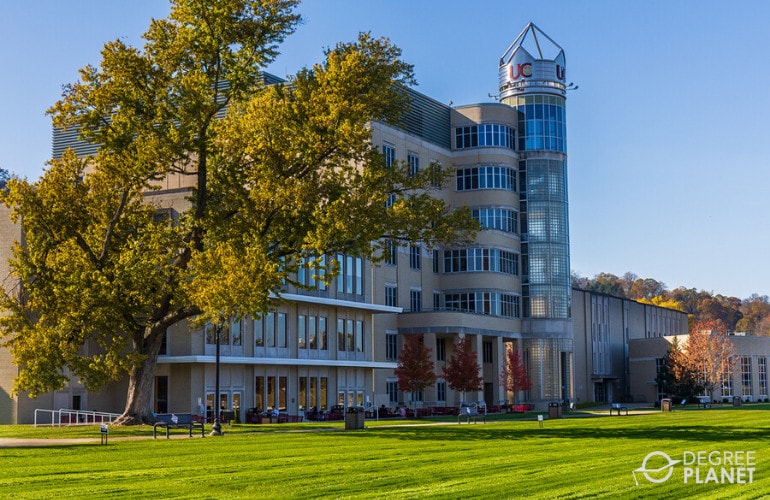Online Ph.D. Programs and Doctorates

Key Takeaways
- A doctoral degree is the highest level of academic degree you can achieve.
- Online doctorate degrees typically take 4-7 years to complete depending on your program and course load.
- Graduates with a doctorate degree often pursue careers in academia, as professors, in research, and in leadership roles.
Online Ph.D. programs and doctorates can be challenging — but they’re often worth the cost and effort , especially if you have a clear passion and career path in mind. With a doctorate, you can become an expert in your field and qualify for leadership roles in academia, research, professional settings, and the government sector.
Whether you’re considering a doctorate in nursing , computer science, education, or business, an online program can help you maintain flexibility while achieving your goals.
Keep reading to learn about the different types of doctorates and Ph.D. programs available online. We’ll cover popular subjects you can study and what jobs you can get after earning your degree.
Doctorate vs. Ph.D.: How Do They Differ?
Many people use the terms “Ph.D.” and “doctorate” interchangeably, but they don’t necessarily mean the same thing.
A doctorate, or doctoral degree, is the highest educational credential you can achieve. Typically, a doctorate takes 4-7 years to earn, though this length can vary depending on your field and program.
Doctorates come in many forms. Professional doctorates are geared toward specific roles and industries. For example, an aspiring business professional might earn a doctor of business administration (DBA), while a budding physician would need to enroll in a doctor of medicine (MD) program.
A doctor of philosophy, or Ph.D., is a specific type of doctorate focused primarily on academic research. Ph.D. students are expected to conduct original research and add to their field’s discourse. Most Ph.D. programs also require you to write and defend a dissertation .
All Ph.D.s are doctorates, but not all doctorates are Ph.D.s.
Online Doctorate Programs That Might Interest You
Learn about start dates, transferring credits, availability of financial aid, and more by contacting the universities below.
Explore Online Ph.D. Programs and Doctorates by Subject
Select the jump links below to learn more about the different subjects you can study in an online doctoral program.
Earning an online doctor of business administration (DBA), Ph.D. in business, or Ph.D. in accounting can give you the credibility and expertise needed to expand into managerial roles at companies and organizations.
Best Doctorate in Business Administration Programs
By Bennett Leckrone
Online Doctorate in Organizational Leadership Programs 2024
By Evan Thompson
Best Online Doctorate in Human Resources
By Meg Whitenton
Criminal Justice & Legal
In an online Ph.D. in criminal justice program, you can choose from concentrations in areas such as forensic science , homeland security, criminal justice policy, criminology , and juvenile justice.
Best Online Doctorate in Criminal Justice Programs 2024
Is a jd-mba program right for me.
By Emily Gillespie-Lord
How Much Does Law School Cost?
By Lyss Welding
Education & Teaching
Interested in education administration or other education leadership roles? Then you might want to consider getting an online doctor of education (Ed.D.) or Ph.D. in education .
Doctorate in Education Program Guide
Best online doctorate in educational leadership programs.
By Thomas Broderick
Doctorate in Curriculum and Instruction Program Guide
By James Mielke
Healthcare plays a large role in the economy, and the number of jobs in this sector continues to increase. Earning an online doctorate in healthcare can put you on the path to becoming a medical provider or securing leadership roles at hospitals, clinics, and more.
Best Online Doctorate in Physical Therapy Programs
By Tyler Epps
Best Online Doctorate in Public Health Programs
Best online doctorate of audiology programs.
By Meg Embry
Humanities & Social Sciences
The humanities and social sciences cover a wide array of subjects, including English literature, anthropology, political science, communication, public administration, and economics.
6 Fast-Growing Public Administration Jobs and How to Land Them
By Danika Miller
Best Doctorate in Journalism Programs
By Tessa Cooper
Best Doctorate in Mass Communication and Media Studies Programs
By Alison Plaut
Looking to advance your nursing career? With a doctorate in nursing, you can move into advanced practice, leadership, and academic roles.
Best Online DNP Programs
By Staff Writers
Online Nursing Doctorate [Ph.D.] Program Guide
By Doug Wintemute
Scholarships for Nursing Students
By James M. Tobin
Psychology & Counseling
If you have a passion for mental health, an online doctorate in psychology or counseling could be right for you. Earning a Ph.D. in one of these subjects qualifies you to work with clients of various ages, identities, and backgrounds.
Online Doctorate in Psychology Programs of 2024
Best psy.d. programs online [apa accredited].
By Genevieve Carlton, Ph.D.
Doctorate in Counseling Programs
Science, technology, engineering, and math.
Prepare for cutting-edge STEM careers with a doctorate in a science, technology, engineering, or math field.
Best Doctorate in Industrial Engineering Programs
Ph.d. in artificial intelligence program guide.
By Jennifer Lee
Best Online Doctorate in Data Science Programs
By Shauna Blackmon
Social Work
A doctorate prepares you for top careers in social work . While you need a master’s degree to become a licensed social worker , a doctorate can advance your policymaking, research, and leadership abilities.
Best Online Doctorate in Social Work (DSW) Programs
Dsw vs. ph.d. in social work: what are the differences, fields of social work: top career paths as a social worker, how much do online ph.d. programs and doctorates cost.
The cost of an online doctorate can add up, especially when you’re typically spending at least three years in your doctoral program.
On average, graduate tuition and fees cost around $20,510 in 2021-2022, according to the National Center for Education Statistics (NCES).
But tuition costs vary widely, with public schools averaging $12,600 per year in tuition and fees and private nonprofit institutions averaging $29,930. When factoring in other expenses, the total cost for a doctorate can increase to over $40,000 per year .
Several factors can affect costs, including the program length and school; however, you’ll likely have many funding options in an accredited doctoral program. In fact, according to numbers shared by the Urban Institute, over 70% of doctoral students receive grant aid .
You might also qualify for scholarships, fellowships, and assistantships to cover costs. And don’t forget: You can take out federal loans as a doctoral student.
What Can You Do With an Online Ph.D. or Doctorate?
Earning an online Ph.D. or doctorate signals to employers your industry expertise and commitment to developing your skills and knowledge. It can also lead to rewarding leadership roles, many of which boast above-average salaries .
Here are some popular roles you can get with an online doctorate.
| Position | Median Annual Salary (May 2023) | Job Growth Rate (2023-2033) | Recommended or Required Degree |
|---|---|---|---|
| $145,760 | 5.2% | JD | |
| $126,260 | 46.3% | DNP or Ph.D. in nursing | |
| $115,730 | 5.1% | Ph.D. in economics | |
| $108,020 | 36% | Ph.D. in data science | |
| $103,460 | 5.5% | DBA or Ph.D. in business | |
| $102,610 | 2.9% | Ed.D. or Ph.D. in education | |
| $99,710 | 14.2% | Doctor of physical therapy (DPT) | |
| $92,740 | 5% | Psy.D. or Ph.D. in psychology | |
| $82,270 | 8% | Ph.D. in desired subject area | |
| $63,800 | 7.8% | Ph.D. in anthropology |
Is an Online Doctoral Degree Worth It?
For many students, earning an online doctorate is worth it for several reasons.
In addition to opening the door to professional leadership opportunities, these degrees routinely provide a pathway to higher salaries. Online programs can also offer increased flexibility for students with full-time jobs, children, or other commitments.
According to the BLS, people with a bachelor’s degree as their highest credential earned a median salary of around $74,000 in 2022, while those with a master’s degree earned a median salary of around $86,000.
However, people with a doctoral degree earned much more, with a median annual salary of around $108,000. This means doctorate-holders earn about $22,000 more each year than those with master’s degrees — and a whopping $34,000 more than those with bachelor’s degrees.
Frequently Asked Questions About Online Ph.D. Programs and Doctorates
Can you do a ph.d. completely online.
Yes, you can earn a Ph.D. in a fully online format. Many doctoral programs in business, education, healthcare, and STEM use an online learning format. In these programs, you’ll complete coursework in a virtual learning environment while meeting any hands-on or clinical requirements in your local area.
Online doctorates from accredited programs meet the same high academic standards and licensure requirements as in-person doctoral programs.
Are online Ph.D. programs and doctorates respected?
Yes, online doctorates are respected. These degrees feature the same curricula and content as on-campus programs. However, since online degrees can’t always provide the same type of instruction and interaction as on-campus programs, some fields — particularly medical ones — do not provide 100% online options.
How long do online Ph.D. programs take?
The typical online Ph.D. program takes 4-7 years to complete. Depending on your course load and schedule, the program may extend beyond that timeline. You may take longer to complete your research and dissertation, for example.
What is the easiest Ph.D. to get?
All Ph.D. and doctoral programs require dedication and stamina to make it through advanced academic courses. That said, Ed.D. programs tend to take less time than other doctorates, meaning you can put your degree to work more quickly.
The difficulty of a doctoral degree ultimately depends on your skills, interests, and career goals, as well as on the specific requirements of each program.
Which Ph.D. is most in demand?
According to BLS data, many positions in healthcare, business, and technology are projected to rank among the fastest-growing jobs in the coming decade . Professionals with advanced degrees in these areas will be needed to fill a large number of open roles.
Explore More College Resources

Highest-Paying Doctoral Degrees

by Amy Nigh
Updated September 13, 2024

Best Online Doctorate Degree No Dissertation Programs

by Genevieve Carlton, Ph.D.
Updated April 30, 2024

Dual Degrees: Combined Master’s and Ph.D. Programs

by Reese Lopez
Updated August 25, 2023
View the most relevant schools for your interests and compare them by tuition, programs, acceptance rate, and other factors important to finding your college home.
How To Get a PhD [2024 Guide – Campus & Online]
Are you wondering how to get a PhD? Although it requires dedication and focus to complete, the process of earning your doctorate can be broken down into a few simple steps.

Earning your PhD is a way to become involved in a specific academic community while strengthening your research, writing, and presentation skills.
Editorial Listing ShortCode:
Professionals who earn their doctoral degree often go on to accept leadership roles in a variety of fields, including academia, education, and healthcare.
How to Get a PhD

Earning a PhD does not have to be a complex process, though it can be a long one. Regardless of the topic you choose to focus on, the journey toward your doctorate will likely begin with earning a bachelors degree and end with a public defense of your doctoral dissertation.
1. Earn an Undergraduate Degree
The road to a PhD begins with earning an undergraduate degree from an accredited school. Bachelor’s degrees generally take about 4 years to complete if you follow a traditional academic schedule.
If you are considering applying for higher degree programs after graduation, it is beneficial to maintain a high grade point average over the course of your undergraduate career. If you aren’t sure whether you’d like to pursue further education, there are generally plenty of career opportunities available for students with a bachelor’s-level education.
2. Obtain a Master’s Program

The next step in your journey will be to obtain a master’s degree from an accredited institution. During your master’s degree program, you will select an area of study on which to focus more. Over the course of your studies, you can develop expertise in your discipline through a combination of theoretical analysis and fieldwork.
Because there are fewer credits required to complete a master’s degree than a bachelor’s degree, a graduate program will typically take 2 years to complete with full-time study. Some schools offer accelerated programs, offering the possibility to finish your degree sooner.
The focus of your master’s degree program will likely inform your professional career or your doctoral field of study. So, it is beneficial to consider the areas you are passionate about and to conduct extensive research into your schools of interest prior to applying.
3. Apply for a PhD Program

After earning your master’s degree, you may be qualified to apply for a doctoral program. One factor that becomes important is the master’s degree GPA needed for a PhD program admission. Admissions requirements will vary from program to program.
Another one of the most important parts of the application process is determining what you will study during your time as a doctoral candidate. Because it may take up to 5 years to complete your PhD, it is essential that you pursue something you are passionate about.
After you decide what you’d like to study, you can begin to research programs and schools to see if they fit your needs. As you conduct your search, you may want to pay close attention to the professors who work in your field of study. You will need someone to advise you, and it can be helpful to have an understanding of the resources available to you before you apply.
4. Complete the Requisite Coursework

If you are admitted to a doctoral program, your first few semesters will be spent completing the required coursework. The courses that you’ll complete will be dependent on your field of study and the specific program you attend.
For example, a student pursuing their PhD in Comparative Studies might take classes on approaches to comparative cultural comparative studies as well as contemporary political problems. Their classes could also cover topics in narrative, culture, and representation.
Taking classes at the start of your program can help you decide on a topic for your final dissertation and may equip you with relevant research skills and tools.
5. Submit a Research Proposal

Once you complete your initial courses, you will be asked to submit a research proposal. A research proposal outlines what topic you are going to focus your research on and what your approach will consist of.
Why is this important? Not only does it give professors a clear understanding of your research, your method, and your thinking, but it also helps you get organized. As you work through your dissertation, you can refer back to what you planned in your proposal to keep you on track.
6. Research and Collect Data

Conducting research and collecting data is a critical component of your PhD. Working toward and completing your dissertation not only allows you to become an expert in your field but also provides the opportunity for you to have a voice in the academic community.
In order to ensure that the information you present is valid, it is necessary to use extensive research to back up your findings.
7. Perform a Literature Review
Once you have chosen a specific research topic, you may be required to perform a literature review. During this review, you will analyze books and papers that are related to your field of study in order to determine any strengths, weaknesses, or gaps. You may also compare different literature and take note of recurring themes.
This review process helps you develop a broader understanding of what research already exists in your field related to your topic of interest. It also helps highlight any gaps that your thesis may be able to fill and identifies prominent authors and works to which you can refer while completing your dissertation.
8. Write and Produce a Thesis and Dissertation
One of the final tasks of your Ph.D. program will be to write and produce a thesis and a dissertation. Your thesis is the question or argument to which all your research will work to answer or prove.
Your dissertation is the collection and presentation of your findings, which should be a comprehensive response to your thesis statement. Dissertations can run in length from 100 pages to 300 pages on average. They often require a significant amount of preparation and effort, along with several months or years of hard work.
9. Defend Dissertation and Public Research

As your final step in your PhD journey, you may be asked to defend your thesis. While this may sound intimidating, it is simply the opportunity for you to present your research and answer questions posed by the thesis committee.
In some cases, this portion of the process is largely symbolic because your dissertation will have already been assessed. Depending on your specific program, this process can take anywhere from 25 minutes to over an hour.
PhD Admissions Requirements

Specific PhD admissions requirements will vary between programs, but most schools typically require the following items:
- GRE or GMAT scores (only some schools require them)
- Statement of purpose
- Undergraduate and graduate degree transcripts
- Letters of recommendation
It’s strategic to research the specific admissions requirements for your schools of interest prior to applying. In addition to these items, some programs may ask for an application fee as well as a resume as proof of experience in your field of interest.
Accreditation

Accreditation is an external and internal review process of an educational program. This process signals to applicants, students, and employers that a program is legitimate.
By choosing to participate in the accreditation process, schools are ensuring that the education they offer is up to current standards. This means that you will most likely be taught by qualified staff members and receive appropriate educational materials.
It is beneficial to check for regional accreditation. This information is often posted on a school’s website, but you can also verify a prospective school’s status by looking through the US Department of Education’s list of accredited institutions.
Is Financial Aid Available?

The most common form of financial aid available to qualifying students is provided by government loans. To determine the amount of federal assistance you qualify for, you can fill out the FAFSA, or the Free Application for Federal Student Aid . This form takes into account details about your personal life and income to ensure a fair decision based on your circumstances.
In addition to federal aid, you can also apply for state aid, a process which will vary by state. You can also check for available scholarships at your schools of interests. There are often unique opportunities to apply for financial help at each school.
What Is a PhD?
A Doctor of Philosophy (PhD) is considered to be among the highest academic degrees you can achieve. A PhD program is centered around developing an original thesis and conducting the accompanying research.
Your final product is often a written dissertation, in which you showcase your research and present your findings. If you are interested in a career in academia or research, then a PhD may be a good fit for you.
Should I Get a PhD?
The question of whether you should obtain a PhD is one that will be determined by your personal career goals and aspirations. As you make your decision, it might be helpful to consider these factors:
- Time and money . Do you have the time and finances needed to complete a PhD?
- Dedication and focus . Will you be able to stay passionate and motivated about one topic while you work through your doctoral program?
- Career goals . How will earning your PhD help propel you toward your professional goals?
Since every doctoral program is unique, you can search for schools that offer the programs that most align with your goals.
Do You Need a Masters to Get a PhD?

No, you do not always need a masters degree in order to earn a PhD, depending on the school and program. While the traditional path to getting a doctorate consists of earning your undergraduate and masters degrees before applying to a PhD program, there are some exceptions.
For schools that allow you to pursue a PhD directly after earning your undergrad degree, you will likely apply as a Master of Philosophy student. After that, you can have the opportunity to submit a thesis proposal for review. If it is accepted, you may be able to continue your research as a PhD candidate.
How Many Credits for a Doctorate Degree?
The amount of credits needed to complete your doctorate will be determined by a number of factors. These include your specific school requirements, the type of degree you earn, your chosen area of study, and the requirements of your state.

Typically, a PhD program will consist of 60 to 120 credits. Your credits will likely be split between electives, major courses, research core courses, and dissertation requirements. Some fields, such as psychology, may require more time and credits to complete.
How Long Does It Take to Get a PhD?
The length of a PhD program varies widely. Most take between 3 to 5 years to complete due to the dissertation requirement.
There are some doctoral programs that require less than 60 credits and do not include a final dissertation. These types of programs can be finished more quickly if you are enrolled full-time. Professional doctorates are more likely to follow this abbreviated structure and are generally intended for students who already have their masters in a specific field.
How Hard Is It to Get a PhD?

Determining how difficult it is to earn a PhD will depend on what you consider to be the biggest roadblocks. As you research your schools of interest, it’s beneficial to check eligibility criteria and admissions requirements. This may be an area of difficulty if you lack the transcripts, finances, or test scores needed to apply.
Alternatively, the admissions process may seem simple, but you might find the prospect of researching one subject over the course of many years a difficult one. It’s strategic to conduct extensive research and consider your career goals as you make your decision.
If Someone Has a PhD, Are They a Doctor?
If someone has a PhD, they are considered a doctor in the academic sense, but they are not a medical doctor (MD).
A doctoral degree is the highest academic degree you can earn. In this case, the term “doctor” simply refers to one’s formal academic standing. Unlike a licensed medical doctor, someone with a PhD is not qualified to perform and provide medical services.
What’s the Difference Between a Professional Doctorate vs. PhD Degree?
A professional doctorate is typically pursued by those who hold a master’s degree in a specific field. A Doctor of Philosophy (PhD) is usually taken on by those interested in conducting extensive research into a topic.
The right degree for you will largely be determined by your career aspirations. Most professionals who pursue a PhD are interested in the field of research or academia.

What’s the Difference Between an MPhil vs. PhD?
An MPhil, or a Master of Philosophy, is a degree that can be taken in place of a PhD or as part of an existing PhD program.
You might consider pursuing an MPhil if you are short on time but would like to conduct research into a certain topic.
Is a PhD Worth It?

Yes, a PhD is worth it for many students. If you are eager to contribute to the existing research around a particular topic, then this degree may be a good fit for you. The Bureau of Labor Statistics lists positive job outlooks for a variety of PhD-level occupations.
For instance, 12% job growth is projected for postsecondary teachers over the next ten years, which is much faster than average. Top executives and management positions are also expected to have positive job outlooks.
Additionally, the research you conduct and the dissertation you create will become part of the larger academic conversation around your area of study. This could be a beneficial way to establish yourself in academia.
Getting Your PhD Degree Online

Getting a a degree from one of the best online PhD programs is a lucrative choice for many students. If you are interested in becoming a leader within academia or contributing significant research to a specific subject area, then this may be a fitting path for you.
Positive job outlooks, higher earning potential, and a multitude of career opportunities also make this degree desirable to many. A number of professionals who earn their PhD go on to pursue leadership roles in education, healthcare, and law.
If you are ready to begin your PhD journey, are are looking for the highest paying doctorate degrees , you can start by researching potential programs from accredited universities today.


- PhD in USA – A Guide for 2024/25
- Finding a PhD
A PhD in USA takes approximately 5 – 6 years of full-time study and can cost between $12,000 – $45,000 per academic year. PhD programs in USA differ from that in the UK and Europe in that students must first take taught classes, coursework and exams before starting their research project.
Why Do a PhD in USA?
The United States has long had some of the most distinguished universities and advanced PhD programmes in the world. Combined with curriculum flexibility, rigorous teaching methods, vast funding opportunities, breathtaking campuses and significant career prospects, it’s no wonder that it is one of the most sought-after study destinations for research students.
In addition to comprehensive training standards, here are a few other reasons why a student may choose to undertake their PhD in the United States:
- Longer learning timeframes – A PhD in the US lasts longer than a PhD in the UK or Europe. This allows students to more confidently transition from undergraduate to postgraduate studies; more commonly referred to as ‘graduate studies’ in the US. This gives you the opportunity to learn more about your subject, research methods and academic writing in general before starting your research project.
- World-class universities – It’s no secret that some of the most well-known higher education institutions that continue to dominate global rankings are based in the United States. Although many factors go into determining whether a position is right for you, a PhD at a high-ranking American university will undeniably have many benefits, from excellent learning standards to access to innovative equipment and deep expertise.
- International network – The US has long been a popular choice among PhD students around the world. As such, the US hosts a diverse and multicultural learning environment in which many research students will quickly feel at home.
- Opportunities – With over 4,000 universities in the US, we can safely say you will have plenty of opportunities to find the ideal combination of project, supervisor and university that works for you.
Universities in USA
Universities in the United States can be divided into two types: public universities and private universities.
Public universities are financed by the state in which they are based. Because of this, public universities charge less for students from within the state and more for students from outside the state, including international students.
Private universities are not financed by their state, but by private donors, research funds and tuition fees. For this reason, private universities generally charge higher tuition fees than public universities and require all students to pay the same amount, regardless of whether they come from out-of-state or abroad.
According to the Times Higher Education World University Rankings 2024 , eight of the top ten universities in the world are located in the United States. These are:
| 1 | UK | University of Oxford |
| 2 | USA | Stanford University |
| 3 | USA | Massachusetts Institute of Technology |
| 4 | USA | Harvard University |
| 5 | UK | University of Cambridge |
| 6 | USA | Princeton University |
| 7 | USA | California Institute of Technology |
| 8 | UK | Imperial College London |
| 9 | USA | University of California, Berkeley |
| 10 | USA | Yale University |
Method of Study
The main difference between a PhD in the US and a PhD in Europe lies in the program structure. Whereas a European PhD essentially consists of a single phase lasting three to four years , an American PhD consists of three different phases, each with its own time frame.
- Phase One – The first phase lasts approximately two years and focuses on building a basic foundation for the doctoral student. This phase consists largely of taught components such as lectures, tutorials and laboratory sessions, in which the student learns more about theoretical concepts and research methods within their discipline.
- Phase Two – The second phase can be considered an assessment phase, which runs both periodically alongside and at the end of the first phase. Here, students complete coursework and take exams on the basis of the material they have covered of which they must pass in order to proceed to the third phase.
- Phase Three – The third phase lasts approximately three years and resembles the European PhD structure. During this period, the student undertakes an independent research project, including forming a research design, conducting experiments, writing a thesis (more commonly referred to in the USA as a dissertation) and sitting a viva exam.
Teaching Requirements
Besides structure, a key difference between a PhD program in the US and in Europe is the focus on teaching requirements. In the US, doctoral students are expected to lecture, lead tutorials, host laboratory sessions, mark coursework and provide office hours for undergraduate students. Although students studying in European will likely contribute to these at some point during their study, this would normally be on a voluntary basis and involve less time commitment.
Research Flexibility
Another difference is project flexibility. In Europe, students typically apply to a PhD project predetermined by a supervisor, and although there may be some scope to adapt the project, depending on the funding provider , it will usually be limited to how the project is carried out rather than what it is about. In the US, however, a student applies to become a doctoral candidate within a department rather than applying for a particular research project. This is because students are expected to decide on their thesis topic (also commonly referred to as a dissertation research topic) near the end of their first phase after they have developed a better understanding of their subject and know where their interests lie. Therefore, research students in the US generally have more flexibility and influence in the direction of their research than students in the United Kingdom or Europe.
PhD Admission Requirements in USA
PhD admission into US universities can be highly competitive, both because of the limited number of positions and the large number of annual applicants.
The eligibility requirements for a doctoral program in the USA can generally be divided into four sections:

- Grade Point Average ( GPA ) – in the US, a scoring system known as Grade Point Average is used to measure academic ability. A student’s GPA is calculated as a weighted score of the subjects they study during their undergraduate degree; an equivalent score is calculated by universities for international applicants. Although universities rarely set minimum GPA requirements for doctoral study, it’s worth being aware that a GPA of 3.0 is equivalent to a UK second class honours (2:1); the typical entry requirement for UK universities.
- Graduate Records Exam (GRE) – most universities will require you to take a series of examinations known as Graduate Records Exams, which are used to determine your suitability for graduate study. GREs will assess your analytical, reasoning and critical thinking skills as well as your depth of your subject.
- Student aptitude – in addition to academic ability, US universities also look for characteristics of a strong researcher. These include traits such as engaging in the subject in your own time, e.g. by attending talks and conferences, demonstrating a high degree of independence and enthusiasm, and a general passion for your subject.
- English Language Proficiency – international students whose first language is not English must sit language exams such as IELTS or TOELF to demonstrate their English language proficiency.
International students will also require a F1 student visa in order to study in the US, however, you would typically apply for this after you have secured a place into a doctorate program.
How to Apply for PhD in USA
When applying for a PhD position at a graduate school, the application process will differ between universities, however, they will all typically ask for the following:
- Academic CV – a short document summarising your educational background and current level of experience .
- Personal statement – a document which outlines why you believe you are suitable for PhD study and your passion for the subject.
- Academic transcripts – a complete breakdown of the modules and their respective marks you have taken as part of your previous/current degree.
- GRE scores – a transcript of your Graduate Records Exam results.
- Research statement – a condensed version of a research proposal outlining your general research interests, if required.
- Recommendation letters – references from several academic referees who endorse your qualities as a person, your abilities as a student and your potential as a doctoral researcher.
Application Deadlines and Fees
Since PhD programs in the United States have taught components, they commence at the same time as all other taught degrees, and therefore share the same application deadlines and start dates. This corresponds to an application period that typically begins in August and ends in February. Admission decisions are typically made in April, with successful students starting in August/September.
When you apply to a graduate school, you will be expected to pay a fee for each doctorate application to cover the school’s administrative costs for processing your application. The fee varies from university to university, but typically ranges from $50 to $100 .
Funding your PhD in USA
It’s very common for a PhD student to receive financial aid in the form of a PhD scholarship; in fact, this will be the case for the vast majority of students in the US.
PhD funding can be ‘fully funded’ covering the student’s graduate program tuition fees, accommodation and living costs, or ‘partially funded’ covering the student’s tuition fee only in part or full.
Besides funding, a graduate student can take on an assistantship, such as a graduate teaching assistant or research assistant, in which they take on a part-time salaried position at the university alongside their studies.
Due to the international and collaborate nature of American universities, there are also a number of international scholarships available, such as the Fulbright Scholarship and the AAUW International Fellowship .
PhD Duration in USA
In the US, a PhD takes approximately 5 – 6 years to complete if studying full-time, and 8 – 10 years if studying part-time.
If you already have a Master’s degree, your first phase can be shortened by one year at the discretion of the university.
Cost of a PhD in USA
The cost of a PhD program in the US can vary considerably depending on the type of university, i.e. whether it’s a public or private university, the doctoral course, i.e. whether it’s in a STEM subject such as computer science, engineering or a non-STEM subject, and whether you are a home or international student.
In general, however, the typical annual tuition fee for a PhD in the US is between $12,000 and $45,000 per academic year.
As with any doctoral degree, additional costs may include travel for collaborations, bench fees, accommodation and living expenses.
Browse PhDs Now
Join thousands of students.
Join thousands of other students and stay up to date with the latest PhD programmes, funding opportunities and advice.
- PRO Courses Guides New Tech Help Pro Expert Videos About wikiHow Pro Upgrade Sign In
- EDIT Edit this Article
- EXPLORE Tech Help Pro About Us Random Article Quizzes Request a New Article Community Dashboard This Or That Game Happiness Hub Popular Categories Arts and Entertainment Artwork Books Movies Computers and Electronics Computers Phone Skills Technology Hacks Health Men's Health Mental Health Women's Health Relationships Dating Love Relationship Issues Hobbies and Crafts Crafts Drawing Games Education & Communication Communication Skills Personal Development Studying Personal Care and Style Fashion Hair Care Personal Hygiene Youth Personal Care School Stuff Dating All Categories Arts and Entertainment Finance and Business Home and Garden Relationship Quizzes Cars & Other Vehicles Food and Entertaining Personal Care and Style Sports and Fitness Computers and Electronics Health Pets and Animals Travel Education & Communication Hobbies and Crafts Philosophy and Religion Work World Family Life Holidays and Traditions Relationships Youth
- Browse Articles
- Learn Something New
- Quizzes Hot
- Happiness Hub
- This Or That Game
- Train Your Brain
- Explore More
- Support wikiHow
- About wikiHow
- Log in / Sign up
- Education and Communications
- College University and Postgraduate
- Academic Degrees
- Doctoral Studies
How to Apply for a PhD in the US
Last Updated: January 18, 2024 Approved
This article was co-authored by Carrie Adkins, PhD . Carrie Adkins is the cofounder of NursingClio, an open access, peer-reviewed, collaborative blog that connects historical scholarship to current issues in gender and medicine. She completed her PhD in American History at the University of Oregon in 2013. While completing her PhD, she earned numerous competitive research grants, teaching fellowships, and writing awards. wikiHow marks an article as reader-approved once it receives enough positive feedback. This article received 20 testimonials and 96% of readers who voted found it helpful, earning it our reader-approved status. This article has been viewed 631,902 times.
Getting a PhD is a challenging undertaking that takes years to achieve. It can also be an incredibly rewarding experience: you'll become a true expert in your field, and you'll be able to apply for a number of interesting jobs, including academic ones. If you're considering a PhD, start by figuring out which programs best fit your needs (they may not always be the ones at the biggest or most prestigious schools). Once you know what those programs are, you can tailor your materials accordingly and put together the best possible application packages.
Ask the wikiHow College Coach
Researching Schools and Programs

- Keep in mind that it is not necessary for you to have a dissertation topic already chosen or even to have an extremely specific research focus. At this stage, you should just have a general idea of what you want to study and why. For example, if you are considering a PhD in English, then you should at least have an idea of the literary period that you wish to focus on.

- For example, if you are planning to pursue a PhD in Chemistry, then you should find out more about the lab facilities at the university that you are considering.
- Try to identify as many potential schools as you can. Graduate school is competitive and you will have a better chance of getting accepted if you submit multiple applications.

- Keep in mind that you may be working closely with the professor(s) you identify, so it is important to select professors who you really admire and whose research genuinely interests you.

- Keep in mind that funding opportunities are competitive. Putting forth a strong application may increase your chances of getting funding, but there are no guarantees.
"Even then, you need a back-up plan (or two or three) before you commit years of your life to a PhD."
Carrie Adkins, PhD

- Location. If you plan to return to your home country during breaks, then some schools may make the trip home less time consuming than others. For example, if you will be flying back to India at the end of each school year, then choosing a school closer to one of the US coasts will make traveling easier than flying out of the Midwest. Keep in mind that it is not a good idea to select a school based solely on location. This will severely limit your choices.
- Cost of living. Some US college towns can be quite expensive, which can make it hard to get by on your student stipend. Look into the average cost of housing, food, and other expenses in the university areas where you plan to apply.
- Extracurricular opportunities. Clubs can other types of groups can make the transition to a US university a bit easier. Many schools have clubs for people from certain countries, who speak certain languages, or who share other interests. Check out the extracurricular opportunities that are available at the universities you are considering.
Meeting the Basic Requirements

- Taking the GRE three to six months in advance is a good idea. You may even want to take it about year before you plan to apply, just in case you do not get a good score and you need to retake it.

- Score requirements vary by university, so check with each university to learn the score requirements before you apply. For TOEFL, you need to have at least a 600 on the paper-based test OR above a 95 to 100 on the internet-based test. For IELTS, you need to have above a 7.0 to 7.5.

- For example, if you plan to apply to 20 different programs, then you will need to ensure that you have about $2,000 for the application fees.
- Keep in mind that the fees may vary drastically among schools. More prestigious schools may charge higher application fees than less prestigious schools.

- For example, some programs require applicants to answer a specific question or set of questions in the statement of purpose.

- For example, it would be better to ask a professor in your discipline than someone who taught an elective class that you enjoyed.
- Having one letter of recommendation from an administrator or employer can be helpful to show a different perspective of your academic goals. For example, you might ask your department’s chairperson, one of the university’s deans, or a current or former boss. As with the professors you ask, the administrator who recommends you should be someone who will give you a glowing recommendation.

- Keep in mind that most schools require official transcripts.
- Sending transcripts may or may not require you to pay fees, depending on your university’s policies.

- If you have a piece that has been published, then this is an especially great choice for the writing sample, but unpublished pieces are fine as well.
Writing Your Statement of Purpose

- You may want to write one “basic” SOP and then alter or add to it as needed based on the special requirements of each university.

- For example, you might say something like, “Since I was a child, I had a passion for the natural world, and this passion led me to my desire to become a biologist.”

- For example, you might say something like, “As an undergrad, I participated in on-campus research expos and even attended a local conference. Then, during my MA program, I had an article accepted to Biology Quarterly and presented at a national conference.” [2] X Research source
- You can also talk about specific courses you took, professors who have supervised your work, and research that you conducted during your BA and MA programs.

- For example, you might say something like, “I hope to develop a new process for growing corn.”

- Try reading each professor’s biography on the university website. You may also consider reading one of these professors’ publications, such as an article or book.
- Try saying something like, “I hope to work with Professor Jones because she and I share a similar interest in botany.”

- Make sure that you include examples throughout your entire SOP.
Submitting Your Application Packets

- Some schools also require letters of recommendation to be submitted via an online system. You may need to submit your recommenders email addresses so that they can access this system.

- Address the packets. Make sure that you double check the addresses for each of your packets to ensure that they will be delivered to the correct location.
- Pay for postage. International postage can be quite expensive, so make sure that you reserve some money to pay for this cost. Pay the postage for each of your packets and send them out.

What Are The Main Reasons People Go To Graduate School?
Expert Q&A

- Even if a university is unable to provide you with direct funding or a scholarship, there may be other opportunities for you to earn an income while you are there, such as research assistantships. Look into this before turning down an offer from a university you might otherwise want to attend. Thanks Helpful 3 Not Helpful 0
- Once you are done with everything, do not forget to thank everybody who helped you, especially the referees who wrote letters of recommendation. Thanks Helpful 2 Not Helpful 0
- Gaining some sort of research or work experience in the field you plan to apply to will greatly improve your chances of admission. Thanks Helpful 0 Not Helpful 0

- Keep your address consistent throughout - do not abbreviate or introduce variations. This makes it all the more difficult for the graduate office to file your documents. Thanks Helpful 18 Not Helpful 5
- Use a reliable courier service to send documents to universities - FedEx, DHL, UPS, etc. Do not use a service for which you cannot track your package. Thanks Helpful 15 Not Helpful 7
ReIated wikiHows
- How to Get a Doctorate in Economics
- How to Ask for a Recommendation Letter
- How to Plan for Graduate School
- How to Write a Statement of Purpose
- How to Apply to College
- How to Become an Academic Philosopher
- How to Ask Your Professor for a Letter of Recommendation Via Email
- How to Take Lecture Notes
- How to Do Postgraduate Medical Education in Us
You Might Also Like

- ↑ http://grad.berkeley.edu/admissions/apply/statement-purpose/
About This Article

To apply for a Ph.D. in the US, earn a Bachelor’s degree and take the GRE, or Graduate Record Examination. Then, carefully read the application instructions of each school to increase your odds of getting accepted. In the mean time, request letters of recommendation from professors in your discipline or an employer. You will also need to have your transcripts on hand, and to write a statement of purpose. For tips on writing a great statement of purpose and nailing the rest of the process, scroll down! Did this summary help you? Yes No
- Send fan mail to authors
Reader Success Stories
Jul 15, 2017
Did this article help you?

Shrawan Balach
Jul 20, 2017
Malshani Gamage
Aug 31, 2016
Sakshi Jain
Jun 20, 2017
Chitra Pawar
Mar 8, 2016

Featured Articles

Trending Articles

Watch Articles

- Terms of Use
- Privacy Policy
- Do Not Sell or Share My Info
- Not Selling Info
Don’t miss out! Sign up for
wikiHow’s newsletter
- What is a PhD?
Written by Mark Bennett
A PhD is a doctoral research degree and the highest level of academic qualification you can achieve. A PhD involves students taking on independent and significant research culminating in a publishing-worthy thesis. The degree normally takes between three and four years of full-time work towards an original contribution to your subject.
This page explains what a PhD is, what it involves and what you need to know if you’re considering applying for a PhD research project , or enrolling on a doctoral programme .
On this page
The meaning of a phd.
The PhD can take on something of a mythic status. Are they only for geniuses? Do you have to discover something incredible? Does the qualification make you an academic? And are higher research degrees just for people who want to be academics?
Even the full title, ‘Doctor of Philosophy’, has a somewhat mysterious ring to it. Do you become a doctor? Yes, but not that kind of doctor. Do you have to study Philosophy? No (not unless you want to) .
So, before going any further, let's explain what the term 'PhD' actually means and what defines a doctorate.
What does PhD stand for?
PhD stands for Doctor of Philosophy. This is one of the highest level academic degrees that can be awarded. PhD is an abbreviation of the Latin term (Ph)ilosophiae (D)octor. Traditionally the term ‘philosophy’ does not refer to the subject but its original Greek meaning which roughly translates to ‘lover of wisdom’.
What is a doctorate?
A doctorate is any qualification that awards a doctoral degree. In order to qualify for one you need to produce advanced work that makes a significant new contribution to knowledge in your field. Doing so earns you the title 'Doctor' – hence the name.
So, is a PhD different to a doctorate? No. A PhD is a type of doctorate .
The PhD is the most common type of doctorate and is awarded in almost all subjects at universities around the world. Other doctorates tend to be more specialised or for more practical and professional projects.
Essentially, all PhDs are doctorates, but not all doctorates are PhDs.
Do you need a Masters to get a PhD?
Not necessarily. It's common for students in Arts and the Humanities to complete an MA (Master of Arts) before starting a PhD in order to acquire research experience and techniques. Students in Science, Technology, Engineering and Mathematics (STEM) don't always need an MS/MSc (Master of Science) to do a PhD as you'll gain training in lab techniques and other skills during your undergraduate degree.
Whether a Masters is a requirement for a PhD also varies by country. Australian PhDs may require a Masters as the equivalent of their own 'honours year' (where students work on research). US PhD programmes often include a Masters.
We have a whole guide dedicated to helping you decide whether a PhD without a Masters is the right route for you.
The origin of the PhD
Despite its name, the PhD isn't actually an Ancient Greek degree. Instead it's a much more recent development. The PhD as we know it was developed in nineteenth-century Germany, alongside the modern research university.
Higher education had traditionally focussed on mastery of an existing body of scholarship and the highest academic rank available was, appropriately enough, a Masters degree.
As the focus shifted more onto the production of new knowledge and ideas, the PhD degree was brought in to recognise those who demonstrated the necessary skills and expertise.
The PhD process – what's required to get a PhD?
The typical length of a PhD is three to four years full-time, or five to six years part-time.
Unlike most Masters courses (or all undergraduate programmes), a PhD is a pure research degree. But that doesn’t mean you’ll just spend years locked away in a library or laboratory. In fact, the modern PhD is a diverse and varied qualification with many different components.
Whereas the second or third year of a taught degree look quite a lot like the first (with more modules and coursework at a higher level) a PhD moves through a series of stages.
A typical PhD normally involves:
- Carrying out a literature review (a survey of current scholarship in your field).
- Conducting original research and collecting your results .
- Producing a thesis that presents your conclusions.
- Writing up your thesis and submitting it as a dissertation .
- Defending your thesis in an oral viva voce exam.
These stages vary a little between subjects and universities, but they tend to fall into the same sequence over the three years of a typical full-time PhD.
The first year of a PhD
The beginning of a PhD is all about finding your feet as a researcher and getting a solid grounding in the current scholarship that relates to your topic.
You’ll have initial meetings with your supervisor and discuss a plan of action based on your research proposal.
The first step in this will almost certainly be carrying out your literature review . With the guidance of your supervisor you’ll begin surveying and evaluating existing scholarship. This will help situate your research and ensure your work is original.
Your literature review will provide a logical jumping off point for the beginning of your own research and the gathering of results . This could involve designing and implementing experiments, or getting stuck into a pile of primary sources.
The year may end with an MPhil upgrade . This occurs when PhD students are initially registered for an MPhil degree and then ‘upgraded’ to PhD candidates upon making sufficient progress. You’ll submit material from your literature review, or a draft of your research findings and discuss these with members of your department in an upgrade exam . All being well, you’ll then continue with your research as a PhD student.
PhDs in other countries
The information on the page is based on the UK. Most countries follow a similar format, but there are some differences. In the USA , for example, PhD students complete reading assignments and examinations before beginning their research. You can find out more in our guides to PhD study around the world .
The second year of a PhD
Your second year will probably be when you do most of your core research. The process for this will vary depending on your field, but your main focus will be on gathering results from experiments, archival research, surveys or other means.
As your research develops, so will the thesis (or argument) you base upon it. You may even begin writing up chapters or other pieces that will eventually form part of your dissertation .
You’ll still be having regular meetings with your supervisor. They’ll check your progress, provide feedback on your ideas and probably read any drafts your produce.
The second year is also an important stage for your development as a scholar. You’ll be well versed in current research and have begun to collect some important data or develop insights of your own. But you won’t yet be faced with the demanding and time-intensive task of finalising your dissertation.
So, this part of your PhD is a perfect time to think about presenting your work at academic conferences , gaining teaching experience or perhaps even selecting some material for publication in an academic journal. You can read more about these kinds of activities below.
The third year of a PhD
The third year of a PhD is sometimes referred to as the writing up phase.
Traditionally, this is the final part of your doctorate, during which your main task will be pulling together your results and honing your thesis into a dissertation .
In reality, it’s not always as simple as that.
It’s not uncommon for final year PhD students to still be fine-tuning experiments, collecting results or chasing up a few extra sources. This is particularly likely if you spend part of your second year focussing on professional development.
In fact, some students actually take all or part of a fourth year to finalise their dissertation. Whether you are able to do this will depend on the terms of your enrolment – and perhaps your PhD funding .
Eventually though, you are going to be faced with writing up your thesis and submitting your dissertation.
Your supervisor will be very involved in this process. They’ll read through your final draft and let you know when they think your PhD is ready for submission.
All that’s left then is your final viva voce oral exam. This is a formal discussion and defence of your thesis involving at least one internal and external examiner. It’s normally the only assessment procedure for a PhD. Once you’ve passed, you’ve done it!
Looking for more information about the stages of a PhD?
How do you go about completing a literature review? What's it like to do PhD research? And what actually happens at an MPhil upgrade? You can find out more in our detailed guide to the PhD journey .
Doing a PhD – what's it actually like?
You can think of the ‘stages’ outlined above as the basic ‘roadmap’ for a PhD, but the actual ‘journey’ you’ll take as a research student involves a lot of other sights, a few optional destinations and at least one very important fellow passenger.
Carrying out research
Unsurprisingly, you’ll spend most of your time as a PhD researcher… researching your PhD. But this can involve a surprisingly wide range of activities.
The classic image of a student working away in the lab, or sitting with a pile of books in the library is true some of the time – particularly when you’re monitoring experiments or conducting your literature review.
Your PhD can take you much further afield though. You may find yourself visiting archives or facilities to examine their data or look at rare source materials. You could even have the opportunity to spend an extended period ‘in residence’ at a research centre or other institution beyond your university.
Research is also far from being a solitary activity. You’ll have regular discussions with your supervisor (see below) but you may also work with other students from time to time.
This is particularly likely if you’re part of a larger laboratory or workshop group studying the same broad area. But it’s also common to collaborate with students whose projects are more individual. You might work on shorter projects of joint interest, or be part of teams organising events and presentations.
Many universities also run regular internal presentation and discussion groups – a perfect way to get to know other PhD students in your department and offer feedback on each other’s work in progress.
Working with your supervisor
All PhD projects are completed with the guidance of at least one academic supervisor . They will be your main point of contact and support throughout the PhD.
Your supervisor will be an expert in your general area of research, but they won’t have researched on your exact topic before (if they had, your project wouldn’t be original enough for a PhD).
As such, it’s better to think of your supervisor as a mentor, rather than a teacher.
As a PhD student you’re now an independent and original scholar, pushing the boundaries of your field beyond what is currently known (and taught) about it. You’re doing all of this for the first time, of course. But your supervisor isn’t.
They’ll know what’s involved in managing an advanced research project over three years (or more). They’ll know how best to succeed, but they’ll also know what can go wrong and how to spot the warning signs before it does.
Perhaps most importantly, they’ll be someone with the time and expertise to listen to your ideas and help provide feedback and encouragement as you develop your thesis.
Exact supervision arrangements vary between universities and between projects:
- In Science and Technology projects it’s common for a supervisor to be the lead investigator on a wider research project, with responsibility for a laboratory or workshop that includes several PhD students and other researchers.
- In Arts and Humanities subjects, a supervisor’s research is more separate from their students’. They may supervise more than one PhD at a time, but each project is essentially separate.
It’s also becoming increasingly common for PhD students to have two (or more) supervisors. The first is usually responsible for guiding your academic research whilst the second is more concerned with the administration of your PhD – ensuring you complete any necessary training and stay on track with your project’s timetable.
However you’re supervised, you’ll have regular meetings to discuss work and check your progress. Your supervisor will also provide feedback on work during your PhD and will play an important role as you near completion: reading your final dissertation draft, helping you select an external examiner and (hopefully) taking you out for a celebratory drink afterwards!
Professional development, networking and communication
Traditionally, the PhD has been viewed as a training process, preparing students for careers in academic research.
As such, it often includes opportunities to pick up additional skills and experiences that are an important part of a scholarly CV. Academics don’t just do research after all. They also teach students, administrate departments – and supervise PhDs.
The modern PhD is also viewed as a more flexible qualification. Not all doctoral graduates end up working in higher education. Many follow alternative careers that are either related to their subject of specialism or draw upon the advanced research skills their PhD has developed.
PhD programmes have begun to reflect this. Many now emphasise transferrable skills or include specific training units designed to help students communicate and apply their research beyond the university.
What all of this means is that very few PhD experiences are just about researching and writing up a thesis.
The likelihood is that you’ll also do some (or all) of the following during your PhD:
The work is usually paid and is increasingly accompanied by formal training and evaluation.
Conference presentation
As a PhD student you’ll be at the cutting edge of your field, doing original research and producing new results. This means that your work will be interest to other scholars and that your results could be worth presenting at academic conferences .
Doing this is very worthwhile, whatever your career plans. You’ll develop transferrable skills in public speaking and presenting, gain feedback on your results and begin to be recognised as an expert in your area.
Conferences are also great places to network with other students and academics.
Publication
As well as presenting your research, you may also have the opportunity to publish work in academic journals, books, or other media. This can be a challenging process.
Your work will be judged according to the same high standards as any other scholar’s and will normally go through extensive peer review processes. But it’s also highly rewarding. Seeing your work ‘in print’ is an incredible validation of your PhD research and a definite boost to your academic CV.
Public engagement and communication
Academic work may be associated with the myth of the ‘ivory tower’ – an insular community of experts focussing on obscure topics of little interest outside the university. But this is far from the case. More and more emphasis is being placed on the ‘impact’ of research and its wider benefits to the public – with funding decisions being made accordingly.
Thankfully, there are plenty of opportunities to try your hand at public engagement as a PhD student. Universities are often involved in local events and initiatives to communicate the benefits of their research, ranging from workshops in local schools to public lectures and presentations.
Some PhD programmes include structured training in order to help students with activities such as the above. Your supervisor may also be able to help by identifying suitable conferences and public engagement opportunities, or by involving you in appropriate university events and public engagement initiatives.
These experiences will be an important part of your development as a researchers - and will enhance the value of your PhD regardless of your career plans.
What is a PhD for – and who should study one?
So, you know what a PhD actually is, what’s involved in completing one and what you might get up to whilst you do. That just leaves one final question: should you do a PhD?
Unfortunately, it’s not a question we can answer for you.
A PhD is difficult and uniquely challenging. It requires at least three years of hard work and dedication after you’ve already completed an undergraduate degree (and probably a Masters degree too).
You’ll need to support yourself during those years and, whilst you will be building up an impressive set of skills, you won’t be directly progressing in a career.
But a PhD is also immensely rewarding. It’s your chance to make a genuine contribution to the sum of human knowledge and produce work that other researchers can (and will) build on in future. However obscure your topic feels, there’s really no such thing as a useless PhD.
A PhD is also something to be incredibly proud of. A proportionately tiny number of people go on to do academic work at this level. Whatever you end up doing after your doctorate you’ll have an impressive qualification – and a title to match. What’s more, non-academic careers and professions are increasingly recognising the unique skills and experience a PhD brings.
Other PhDs - do degree titles matter?
The PhD is the oldest and most common form of higher research degree, but a few alternatives are available. Some, such as the DPhil are essentially identical to a PhD. Others, such as the Professional Doctorate or DBA are slightly different. You can find out more in our guide to types of PhD .
Is a PhD for me?
There’s more advice on the value of a PhD – and good reasons for studying one – elsewhere in this section. But the following are some quick tips if you’re just beginning to consider a PhD.
Speak to your lecturers / tutors
The best people to ask about PhD study are people who’ve earned one. Ask staff at your current or previous university about their experience of doctoral research – what they enjoyed, what they didn’t and what their tips might be.
If you’re considering a PhD for an academic career, ask about that too. Are job prospects good in your field? And what’s it really like to work at a university?
Speak to current PhD students
Want to know what it’s like studying a PhD right now? Or what it’s like doing research at a particular university? Ask someone who knows.
Current PhD students were just like you a year or two ago and most will be happy to answer questions.
If you can’t get in touch with any students ‘face to face’, pop over to the Postgraduate Forum – you’ll find plenty of students there who are happy to chat about postgraduate research.
Take a look at advertised projects and programmes
This may seem like a strange suggestion. After all, you’re only going to study one PhD, so what’s the point of reading about lots of others?
Well, looking at the details of different PhD projects is a great way to get a general sense of what PhD research is like. You’ll see what different PhDs tend to have in common and what kinds of unique opportunity might be available to you.
And, with thousands of PhDs in our database , you’re already in a great place to start.
Read our other advice articles
Finally, you can also check out some of the other advice on the FindAPhD website. We’ve looked at some good (and bad) reasons for studying a PhD as well as the value of a doctorate to different career paths.
More generally, you can read our in-depth look at a typical PhD journey , or find out more about specific aspects of doctoral study such as working with a supervisor or writing your dissertation .
We add new articles all the time – the best way to stay up to date is by signing up for our free PhD opportunity newsletter .
Ready to find your PhD?
Head on over to our PhD search listings to learn what opportunities are on offer within your discipline.
Our postgrad newsletter shares courses, funding news, stories and advice
Mark bennett.
Mark joined FindAPhD to develop our first ever advice articles in 2013 and now serves as our Director of Audience & Editorial, making sure our websites and information are as useful as possible for people thinking about Masters and PhD study. He has a PhD in English Literature from the University of Sheffield, as well as Bachelors and Masters degrees from the University of Kent and the University of South Wales.
You may also like...

What happens during a typical PhD, and when? We've summarised the main milestones of your PhD journey to show you how to get a PhD.

The PhD thesis is the most important part of a doctoral degree. This page will introduce you to what you need to know about the PhD dissertation.

This page will give you an idea of what to expect from your routine as a PhD student, explaining how your daily life will look at you progress through a doctoral degree.

PhD fees can vary based on subject, university and location. Use our guide to find out the PhD fees in the UK and other destinations, as well as doctoral living costs.
FindAPhD. Copyright 2005-2024 All rights reserved.
Unknown ( change )
Have you got time to answer some quick questions about PhD study?
Select your nearest city
You haven’t completed your profile yet. To get the most out of FindAPhD, finish your profile and receive these benefits:
- Monthly chance to win one of ten £10 Amazon vouchers ; winners will be notified every month.*
- The latest PhD projects delivered straight to your inbox
- Access to our £6,000 scholarship competition
- Weekly newsletter with funding opportunities, research proposal tips and much more
- Early access to our physical and virtual postgraduate study fairs
Or begin browsing FindAPhD.com
or begin browsing FindAPhD.com
*Offer only available for the duration of your active subscription, and subject to change. You MUST claim your prize within 72 hours, if not we will redraw.

Create your account
Looking to list your PhD opportunities? Log in here .
